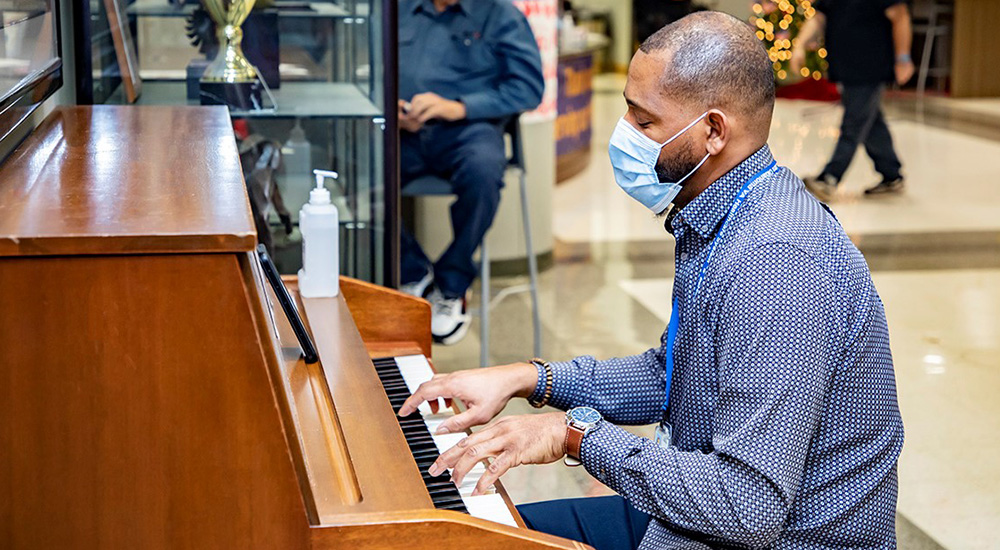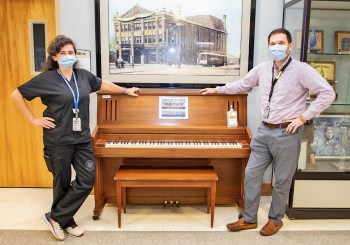On any given day, Veterans and staff at the Jack C. Montgomery VA may find themselves listening to the melodic sound of the piano being played in the main lobby of the facility.
Katelynn Quinn, music therapist, was originally inspired to place the piano in the lobby after seeing pianos located in public places such as airports and malls. After locating a retired piano at the medical center in storage, she took that idea and turned it into reality.
Instead of ordering a new one, Quinn worked to have the piano moved to the lobby. She and the Whole Health Program staff worked with several services and staff to get the piano placed for Veterans and staff to enjoy.
“For our Veterans who spend a good portion of their day here, it can help just having something they can play around with, like the piano or the guitar,” said Quinn. “I love working with our Veterans because they mean the world to me, and if music can help bring more joy to them and our facility, I’m all for it. I also have wonderful co-workers who have been very supportive of the program, and we just want our Veterans to know that you don’t have to have a background in music to benefit from music therapy.”
Wonderful to be welcomed by music
Dr. Nathan Williams, Whole Health clinical director, says they have plans to have the piano decorated to further add to its impact in the lobby. Decorating the piano is an idea which drew inspiration from another music therapy initiative, “Challenge America Music Retreat,” which places locally painted guitars into the hands of Veterans to help support progress and growth in dealing with a variety of issues.
“It has been wonderful to be welcomed by music when entering the area and to hear the lobby liven up with the addition of someone playing,” said Williams. “We have some very talented Veterans, employees and guests who like to share their talents with the facility. We are grateful for everyone involved in helping make Katelynn’s vision a reality.”
Music therapy is a newer program to the Eastern Oklahoma VA, with Quinn currently being the only music therapist.
Therapeutic value of music invaluable for physical, mental and emotional conditions
“Katelynn does a fantastic job of meeting Veterans where they are and welcoming them on a therapeutic journey using music as the catalyst,” said Williams. “Some of the transformations that we have witnessed in Veterans using music therapy have been borderline miraculous. It is a form of therapy that had never been offered prior to Katelynn arriving and we are so proud of the impact that she is having.”
Williams clarified that music therapy is not the same as providing music lessons, although learning an instrument may be a part of the journey.
“The process is focused on the therapeutic value of music and can be invaluable for many physical, mental and emotional conditions,” he said. “If a Veteran is interested in music therapy, Katelynn offers appointments in Tulsa, Muskogee and virtually using VA Video Connect. We encourage any Veteran who is interested in music therapy to speak with their provider to request a consult.”
Topics in this story
More Stories
The Medical Foster Home program offers Veterans an alternative to nursing homes.
Watch the Under Secretary for Health and a panel of experts discuss VA Health Connect tele-emergency care.
The 2024 National Veteran Suicide Prevention Annual Report provides the foundation for VA’s suicide prevention programs and initiatives.








Piano at Jerry Pettis VA hospital in Loma Linda, Calif is therapeutic and soothing.
The VA would do well to hire a harpist for each hospital across our great nation. These musicians could play bedside as well as in lobbies, conference rooms, and auditoriums. Science supports using music as another path to promote healing and wellness. As a retired veteran and former military musician, I’ve experienced the therapeutic effects of music for myself, and for others. I’d welcome the opportunity to share my talent.
From Bon Secours St. Mary’s Hospital:
“Studies show that when we experience music, our brains and bodies have an increase of endorphins, a neurotransmitter that relieves pain, and a decrease of cortisol, a stress response hormone.
During a music experience, our bodies release the neurotransmitters dopamine, which is a feel-good hormone, serotonin, which is a comfort hormone, and oxytocin, which is a social bonding hormone. There aren’t many things that release all these neurotransmitters at once. Most things we do or that happen to us cause the release of one or two of these, but music results in all three being released. This is the physiological reason music has a powerful effect on things like our healing and ability to connect with others.”
The Tucson, AZ main VA campus also has a piano in its lobby, very enjoyable to hear it being played.
I’d love to hear more about using VA Video Connect – please contact me at:
Thanks!